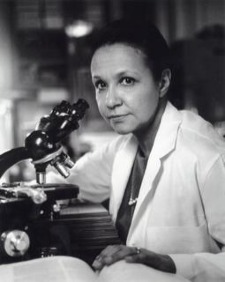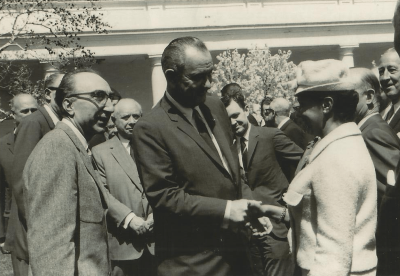Dear Colleagues,
Following up Black History Month in February is Women’s History Month in March. It is a fitting time to remember Jane Cooke Wright, MD, (1919-2013) a leader in the field of cancer therapeutics.
Dr. Wright was born in New York City and attended the prestigious Smith College in Massachusetts. She wanted to attend Harvard Medical School, but they were not accepting women into medical school at that time. Her father, Louis Wright, MD, was one of the early African American graduates of Harvard Medical School and became a prominent surgeon and cancer researcher in New York City. He was the first African American admitted to the American College of Surgeons.
Jane followed in his footsteps, and together, they would become a team in fighting cancer.

She attended New York Medical College on a four-year scholarship and then was an intern and resident at Bellevue Hospital and Harlem Hospital. Harlem Hospital at the time was primarily used by affluent white individuals and her father had risen to the director of surgery and then the chair of the Medical Board. He established the Cancer Research Foundation to study chemotherapy with grants from the National Cancer Institute.
Jane joined her father, and they became a team in fighting cancer. Dr. Louis Wright died of a heart attack and Jane took over the work and directorship of the cancer program at Harlem Hospital at the age of 33. In the laboratory, she screened hundreds of drugs for their potential to kill human tumors. Using cells from cancer patients obtained at the time of surgery or biopsy, she developed tissue cultures of these cells and exposed the tumor cells to a variety of drugs. There were only about 20 anti-cancer drugs available at the time and she would try to predict which drug would be most effective in destroying that patient’s tumor cells.
This was very much an early attempt at precision medicine targeted for an individual patient.
In 1951, she was a pioneer in establishing that methotrexate was effective in treating breast cancer, which led to accepting chemotherapy as a treatment for cancer. Methotrexate continues to be used to this day. Prior to that time, there was significant hesitancy toward chemotherapy, which was used as a last resort.

President Lyndon B. Johnson appointed Dr. Wright to the President’s Commission on Heart Disease, Cancer and Stroke. In 1967, she returned to New York Medical College and became professor of surgery, the head of the cancer chemotherapy department and an associate dean, becoming the highest ranking African American woman at a nationally recognized medical institution and the first African American dean at a medical school. The accolades continued as she was the first woman to be elected the president of the New York Cancer Society. She was one of seven founding members — and the only woman — of the American Society of Clinical Oncology.
Dr. Wright mentored many students and scientists over her 40-year career. She published many research papers on cancer chemotherapy and led delegations of cancer researchers to Africa, China, Eastern Europe and the Soviet Union.
She married an attorney and they had two daughters, Jane, who became a psychiatrist, and Alison, became a clinical psychologist. She had her first daughter as a resident in 1948. She took a six-month leave for the birth of her first daughter and returned to complete her residency as the chief resident.
Alison said of her mother in a 2011 interview: “She never looked at things as obstacles. She looked at them as challenges and I think that she was a very ambitious person and I think that she never let anything stand in the way of her doing what she wanted to do.”
This Tuesday, March 8, is International Women’s Day. The theme this year is #BreakTheBias, which seeks to create a gender equal world free of bias, stereotypes and discrimination. In learning more about Dr. Wright, I hope you have been able to see how she fought against — and achieved so much — in the face of inequity.
Sincerely,

Richard Barohn, MD
Executive Vice Chancellor for Health Affairs
University of Missouri
rbarohn@health.missouri.edu
References:
Wright JC, Prigot A, Wright BP, Weintraub S, Wright LT. An evaluation of folic acid antagonists in adults with neoplasticism diseases: a study of 93 patients who incurable neoplasms. Journal of the National Medical Association 1951: 43:211-240.
Wright JC, Cobb JP, Gumport SL, Golomb FM, Safari D. Investigation of the relation between clinical and tissue-culture response to chemotherapeutic agents on human cancer. New England Journal of Medicine. 1957; 257: 1207-1211.
Swain SM. A passion for solving the Puzzle of Cancer: Jane Cooke Wright MD, 1919-2013. The Oncologist. 2013; 18:646-648.
Otha Richard Sullivan. Jane Cooke Wright MD. In: African American Women Scientists and Inventors. Joseph-Bass publisher. San Francisco 2002. 56-61.





